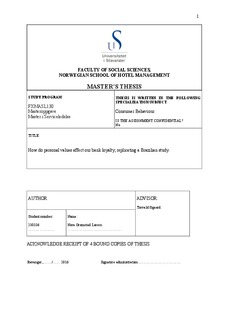How do personal values affect our bank loyalty; replicating a Brazilian study.
Master thesis
Permanent lenke
http://hdl.handle.net/11250/2416558Utgivelsesdato
2016-05Metadata
Vis full innførselSamlinger
- Studentoppgaver (SV-NHS) [561]
Sammendrag
As the banking industry becomes more digitalized by the day, challenges arises and must be
taken into consideration by bank managers. Customers expect the bank to be up today
concerning technological products and services, and the user interface to be top-notch. One of
the banks challenges is to recognize the importance of develop the technological products
needed to satisfy its customers.
Customer loyalty is essential for the retail banks if they are to continue doing business as they
know it, and still make money. Therefore, the need to understand customer loyalty and the
drivers behind the loyalty, or disloyalty, is highly present.
The main question in this thesis is; “How do personal values affect our bank loyalty?”
In this study, I will replicate an empirical study executed in Brazil in 2014 by Jorge Luiz
Henrique and Celso Augusto de Matos. Questionnaire were distributed via social media and
snowball sampling, and the total selection were 154 cases. The hypothesis tests the correlation
between personal values and bank loyalty. The Rokeach Value Survey and Oliver´s four
stages of loyalty make a basis for the conceptual model. Are people who value growth and
achievement illoyal bank customers? Are people who value safety and security loyal
customers? The findings in my analysis will prove to be very different from the Brazilian
study. As the Brazilian study concluded that customers that value growth and achievement
were illoyal, and the correlation between the personal values and loyalty was very strong, my
findings can only suggest a trend, and the trend shows weak correlation between personal
values and the four stages of loyalty.
Beskrivelse
Master's thesis in Service management
